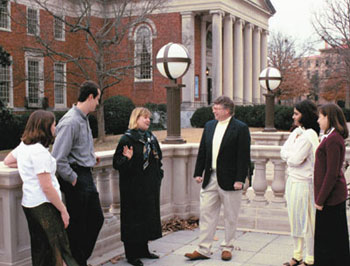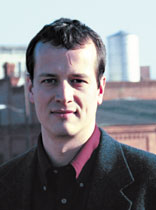

A publication of The Graduate School, University of North Carolina at Chapel Hill
Archives Spring 2001
Home | Back issues | About us | Email your feedback | The Graduate School | UNC-Chapel Hill | Make a gift
When
Drs. Bibb Latané and Deborah Richardson Latané founded the
interdisciplinary Latané Family Fellowship in Human Sciences in
1999, they purposely left the term “human sciences” undefined.
More than anything, the Latanés want the program to define itself.
 |
| Photo by Rich Fowler |
| Latané fellows share thoughts about their research at monthly seminars on the University campus. |
In
its first year, the Latané Fellowship is helping six talented graduate
students, each with wide-ranging interdisciplinary interests, do just
that. “The Latané program is trying to do something the University
needs more of,” said Latané Senior Fellow Thad Guldbrandsen.
“It’s promoting a truly interdisciplinary dialogue on campus.”
That
dialogue has already translated into valuable lessons for its fellows:
Guldbrandsen (anthropology), Catherine S. Renault (public policy), Laura
A. Feagans (psychology), Kimberly A. Schaefer (anthropology), Shweta Singh
(social work) and Michael Allsep (history). At monthly seminars, they
share thoughts about their research, which Guldbrandsen said, “will
help them develop their own research programs in a way that transcends
the boundaries of their own disciplines.”
Remarkably, each Latané fellow’s own interdisciplinary interests transcend innumerable boundaries. Take Kim Schaefer, for example. Her dual interest in archaeology and paleoethnobotany will take her to Peru to study the origins of agriculture. She’ll study the domestication of wild plants by looking at plant fossils. And Cathy Renault investigates ways to drive economic development at rural universities by investing in science and technology programs. Add Laura Feagans, whose research involves deconstructing family, peer and community influences on at-risk youths’ academic achievements, with an eye toward evaluating juvenile intervention programs.
Considering the preciseness and diversity of their research interests, one might wonder what one Latané fellow could offer another. Schaefer responds this way: “A lot of people throughout the University explore topics I’m interested in, but using completely different methods and theoretical positions. I’ve read many books that combine subjects studied by different academic fields. When they’re written by a practitioner of only one field, invariably, the information from the other field is not done full justice. I’m a big fan of co-authoring interdisciplinary works,” Schaefer said.
In that spirit, Guldbrandsen
said, “Understanding contemporary issues and human problems calls
for approaches that bridge disciplinary divides, cut across scholarly
barriers, and ultimately create ways of understanding that didn’t
otherwise exist.”
It’s a daunting challenge, to say the least, but even in what might be considered a transition year, the Latané fellows are off and running. As a group, they have met with members of their faculty advisory boards, with Carolina’s Scholarly Communication Work Group and with other distinguished faculty, all of whom they expect to collaborate with in the near future.
Combining what they will have
learned from one another, their professors and visiting scholars, the
fellows presented a mini-conference in March on the roles of non-profits
and other philanthropic organizations in contemporary society.
Titled “21st Century Activism?
Political Action, Governance, and the Non-profit Sector,” the conference
featured speakers from the North Carolina Center for Non-Profits and Professor
Peter Dobkin Hall from Harvard’s Kennedy School of Government. The
event brought together UNC-Chapel Hill students, faculty and the North
Carolina community for a daylong workshop featuring panel discussions
and audience reactions.
 |
| Photo by Rich Fowler |
| "Each Latané fellow is innovative and involved in the human sciences," says Senior Fellow Thad Buldbrandsen, who researches urban restructuring and political activism in Durham, N.C. |
Guldbrandsen outlined the central
issues of the conference: “Over the past 30 years, non-profits have
emerged as an important element of American politics. Unlike other forms
of political expression, non-profits give people a unique opportunity
to be proactive.”
Despite Guldbrandsen’s keen interest in non-profits, his research only peripherally relates to them. He’s currently examining urban revitalization in Durham, N.C. By examining changes to the political and economic landscape in Durham, Guldbrandsen is charting changes in local political activism. And if those interests don’t seem eclectic enough, consider that Guldbrandsen has not only just finished co-writing a book but has also worked as a satellite imagery analyst and substitute public school teacher in New Hampshire.
The other Latané fellows
boast equally impressive achievements. Michael Allsep, for example, was
once Assistant Public Defender for Spartanburg County, S.C., and later
Assistant Solicitor. He then ran a private law practice, handling state
and federal civil and criminal trials, and Navy court-martials. “After
10 years,” Allsep said, “I closed my practice to begin a new
career as a university history professor.” Now, Allsep studies Allied
military leaders’ responses to the Holocaust.
Shweta Singh, a licensed social
worker, studies the emerging field of social marketing, fusing concepts
of marketing and communication to design social work programs. Before
that, she was a consultant for UNICEF and a reporter on the business desk
of a national daily newspaper in India.
Despite the sheer breadth of the Latané fellows’ interests, they do share certain qualities — which happen to be the very criteria for becoming a Latané fellow. “Each Latané fellow is innovative, inquisitive and involved in the human sciences,” Guldbrandsen said. “Since the term ‘human sciences’ is not set in stone,” he said, “graduate students from any discipline are invited to join the program and broaden that definition.”
And because the Latané
Fellowship is designed to evolve, Guldbrandsen said, “The program
may vary profoundly from year to year.” What direction it takes,
he added, will depend on the direction in which the Latané fellows
steer the program.
-Joshua Myerov
© 2002, The Graduate School, The University of
North Carolina at Chapel Hill
All text and images are property of The Graduate School
at the University of North Carolina-Chapel Hill. Contact Sandra Hoeflich
at shoeflic@email.unc.edu
to request permission for reproduction.
Contact Alexandra Obregon at aobregon@email.unc.edu if you have technical problems with this Web site.